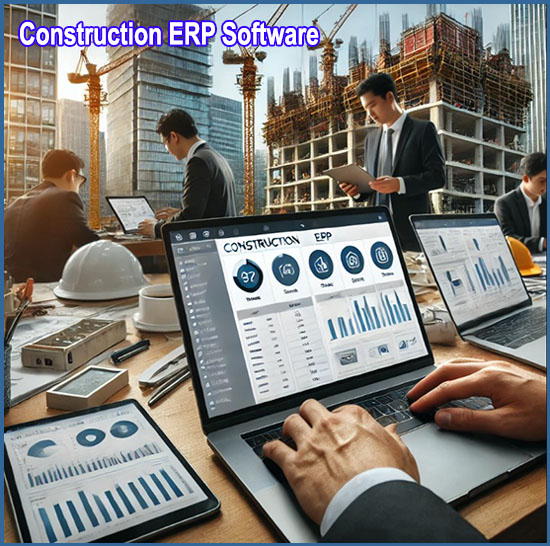Construction ERP Software: Transforming the Industry
Construction ERP software has revolutionized the way construction projects are managed and executed. From initial planning and design to project delivery, ERP (Enterprise Resource Planning) software for construction streamlines processes, improves communication, and ensures project goals are met efficiently.

Key Benefits of Construction ERP Software
1. Enhanced Project Management:
ERP software centralizes all project-related data, allowing project managers to monitor timelines, resource allocation, and budget usage. This real-time visibility into project progress enhances decision-making and helps prevent delays.
2. Streamlined Document Management:
Construction projects involve vast amounts of documentation, from permits to design changes. Construction ERP software consolidates and organizes these documents in a single platform, making it easier for teams to access necessary files anytime, anywhere.
3. Cost Control and Budgeting:
With ERP software, construction companies can efficiently track expenses and stay within budget. Automated features ensure that every financial transaction is recorded accurately, helping project managers identify cost-saving opportunities.
4. Improved Collaboration Across Teams:
Construction ERP software fosters collaboration among architects, engineers, contractors, and subcontractors. Team members can communicate effectively, share files, and stay updated on changes, reducing misunderstandings and errors.
Essential Features of Construction ERP Software
1. Real-Time Data Analytics:
With construction ERP software, data analytics enables project stakeholders to identify patterns, forecast potential delays, and assess project performance.
2. Scheduling and Resource Allocation Tools:
Effective resource management is critical in construction. ERP solutions allocate resources effectively, ensuring equipment, labor, and materials are available when needed.
3. Mobile Accessibility for On-Site Efficiency:
With mobile-friendly ERP solutions, on-site workers can input data, view updates, and communicate directly from the construction site, eliminating delays in reporting and enhancing productivity.
4. Integrated Supply Chain Management:
Construction projects rely on a complex supply chain. ERP software integrates supply chain management, tracking materials from order to delivery, reducing shortages and minimizing downtime.
5. Compliance and Quality Control:
ERP systems include compliance tracking tools, helping companies adhere to industry regulations and standards.
Implementation Steps for Construction ERP Software
- Assess Business Needs and Objectives:
Define what you aim to achieve with the ERP system, such as project efficiency or cost reduction, to determine the features you require. - Select the Right ERP Provider:
Different providers offer specialized ERP solutions tailored to various industries. Choose a provider experienced in the construction sector for the best results. - Train Employees and Promote Adoption:
Training sessions ensure that employees can use the ERP tools effectively, maximizing the software’s value. - Monitor and Refine Usage:
Post-implementation, review the software’s impact on project efficiency and make necessary adjustments.
Conclusion: The Future of Construction ERP
Construction ERP software has become essential to overcoming the industry’s complex challenges, from managing resources to meeting compliance standards. Embracing ERP technology gives construction firms a competitive edge, allowing them to deliver projects on time and within budget. As the industry evolves, so too will ERP capabilities, adapting to new demands and helping companies innovate in every project.
By incorporating Construction ERP software, construction companies can streamline processes, improve resource management, and foster team collaboration, ultimately leading to more successful projects.